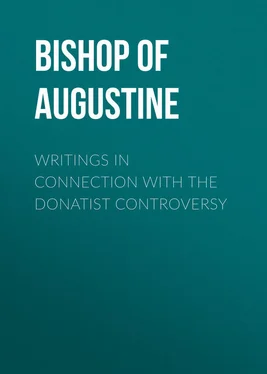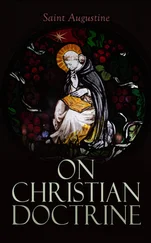Saint Augustine - Writings in Connection with the Donatist Controversy
Здесь есть возможность читать онлайн «Saint Augustine - Writings in Connection with the Donatist Controversy» — ознакомительный отрывок электронной книги совершенно бесплатно, а после прочтения отрывка купить полную версию. В некоторых случаях можно слушать аудио, скачать через торрент в формате fb2 и присутствует краткое содержание. Жанр: foreign_antique, foreign_prose, на английском языке. Описание произведения, (предисловие) а так же отзывы посетителей доступны на портале библиотеки ЛибКат.
- Название:Writings in Connection with the Donatist Controversy
- Автор:
- Жанр:
- Год:неизвестен
- ISBN:нет данных
- Рейтинг книги:3 / 5. Голосов: 1
-
Избранное:Добавить в избранное
- Отзывы:
-
Ваша оценка:
- 60
- 1
- 2
- 3
- 4
- 5
Writings in Connection with the Donatist Controversy: краткое содержание, описание и аннотация
Предлагаем к чтению аннотацию, описание, краткое содержание или предисловие (зависит от того, что написал сам автор книги «Writings in Connection with the Donatist Controversy»). Если вы не нашли необходимую информацию о книге — напишите в комментариях, мы постараемся отыскать её.
Writings in Connection with the Donatist Controversy — читать онлайн ознакомительный отрывок
Ниже представлен текст книги, разбитый по страницам. Система сохранения места последней прочитанной страницы, позволяет с удобством читать онлайн бесплатно книгу «Writings in Connection with the Donatist Controversy», без необходимости каждый раз заново искать на чём Вы остановились. Поставьте закладку, и сможете в любой момент перейти на страницу, на которой закончили чтение.
Интервал:
Закладка:
Chap. ii. – 3. And so the Donatists in some matters are with us; in some matters have gone out from us. Accordingly, those things wherein they agree with us we forbid them not to do; but in those things in which they differ from us, we earnestly endeavour that they should come and receive them from us, or return and recover them, as the case may be. We do not therefore say to them, "Abstain from giving baptism," but "Abstain from giving it in schism." Nor do we say to those whom we see them on the point of baptizing, "Do not receive the baptism," but "Do not receive it in schism." For if any one were compelled by urgent necessity, being unable to find a Catholic from whom to receive baptism, and so, while preserving Catholic peace in his heart, should receive from one without the pale of Catholic unity the sacrament which he was intending to receive within its pale, this man, should he forthwith depart this life, we deem to be none other than a Catholic. But if he should be delivered from the death of the body, on his restoring himself in bodily presence to that Catholic congregation from which in heart he had never departed, so far from blaming his conduct, we should praise it with the greatest truth and confidence; because he trusted that God was present to his heart, while he was striving to preserve unity, and was unwilling to depart this life without the sacrament of holy baptism, which he knew to be of God, and not of men, wherever he might find it. But if any one who has it in his power to receive baptism within the Catholic Church prefers, from some perversity of mind, to be baptized in schism, even if he afterwards bethinks himself to come to the Catholic Church, because he is assured that there that sacrament will profit him, which can indeed be received but cannot profit elsewhere, beyond all question he is perverse, and guilty of sin, and that the more flagrant in proportion as it was committed wilfully. For that he entertains no doubt that the sacrament is rightly received in the Church, is proved by his conviction that it is there that he must look for profit even from what he has received elsewhere.
Chap. iii. – 4. There are two propositions, moreover, which we affirm, – that baptism exists in the Catholic Church, and that in it alone can it be rightly received, – both of which the Donatists deny. Likewise there are two other propositions which we affirm, – that baptism exists among the Donatists, but that with them it is not rightly received, – of which two they strenuously confirm the former, that baptism exists with them; but they are unwilling to allow the latter, that in their Church it cannot be rightly received. Of these four propositions, three are peculiar to us; in one we both agree. For that baptism exists in the Catholic Church, that it is rightly received there, and that it is not rightly received among the Donatists, are assertions made only by ourselves; but that baptism exists also among the Donatists, is asserted by them and allowed by us. If any one, therefore, is desirous of being baptized, and is already convinced that he ought to choose our Church as a medium for Christian salvation, and that the baptism of Christ is only profitable in it, even when it has been received elsewhere, but yet wishes to be baptized in the schism of Donatus, because not they only, nor we only, but both parties alike say that baptism exists with them, let him pause and look to the other three points. For if he has made up his mind to follow us in the points which they deny, though he prefers what both of us acknowledge to what only we assert, it is enough for our purpose that he prefers what they do not affirm and we alone assert, to what they alone assert. That baptism exists in the Catholic Church, we assert and they deny. That it is rightly received in the Catholic Church, we assert and they deny. That it is not rightly received in the schism of Donatus, we assert and they deny. As, therefore, he is the more ready to believe what we alone assert should be believed, so let him be the more ready to do what we alone declare should be done. But let him believe more firmly, if he be so disposed, what both parties assert should be believed, than what we alone maintain. For he is inclined to believe more firmly that the baptism of Christ exists in the schism of Donatus, because that is acknowledged by both of us, than that it exists in the Catholic Church, an assertion made alone by the Catholics. But again, he is more ready to believe that the baptism of Christ exists also with us, as we alone assert, than that it does not exist with us, as they alone assert. For he has already determined and is fully convinced, that where we differ, our authority is to be preferred to theirs. So that he is more ready to believe what we alone assert, that baptism is rightly received with us, than that it is not rightly so received, since that rests only on their assertion. And, by the same rule, he is more ready to believe what we alone assert, that it is not rightly received with them, than as they alone assert, that it is rightly so received. He finds, therefore, that his confidence in being baptized among the Donatists is somewhat profitless, seeing that, though we both acknowledge that baptism exists with them, yet we do not both declare that it ought to be received from them. But he has made up his mind to cling rather to us in matters where we disagree. Let him therefore feel confidence in receiving baptism in our communion, where he is assured that it both exists and is rightly received; and let him not receive it in a communion, where those whose opinion he has determined to follow acknowledge indeed that it exists, but say that it cannot rightly be received. Nay, even if he should hold it to be a doubtful question, whether or no it is impossible for that to be rightly received among the Donatists which he is assured can rightly be received in the Catholic Church, he would commit a grievous sin, in matters concerning the salvation of his soul, in the mere fact of preferring uncertainty to certainty. At any rate, he must be quite sure that a man can be rightly baptized in the Catholic Church, from the mere fact that he has determined to come over to it, even if he be baptized elsewhere. But let him at least acknowledge it to be matter of uncertainty whether a man be not improperly baptized among the Donatists, when he finds this asserted by those whose opinion he is convinced should be preferred to theirs; and, preferring certainty to uncertainty, let him be baptized here, where he has good grounds for being assured that it is rightly done, in the fact that when he thought of doing it elsewhere, he had still determined that he ought afterwards to come over to this side.
Chap. iv. – 5. Further, if any one fails to understand how it can be that we assert that the sacrament is not rightly conferred among the Donatists, while we confess that it exists among them, let him observe that we also deny that it exists rightly among them, just as they deny that it exists rightly among those who quit their communion. Let him also consider the analogy of the military mark, which, though it can both be retained, as by deserters, and also be received by those who are not in the army, yet ought not to be either received or retained outside its ranks; and, at the same time, it is not changed or renewed when a man is enlisted or brought back to his service. However, we must distinguish between the case of those who unwittingly join the ranks of these heretics, under the impression that they are entering the true Church of Christ, and those who know that there is no other Catholic Church save that which, according to the promise, is spread abroad throughout the whole world, and extends even to the utmost limits of the earth; which, rising amid tares, and seeking rest in the future from the weariness of offences, says in the Book of Psalms, "From the end of the earth I cried unto Thee, while my heart was in weariness: Thou didst exalt me on a rock." 8 8 Ps. lxi. 2, 3. Augustine translates from the Septuagint. The English version is: "From the end of the earth will I cry unto Thee, when my heart is overwhelmed: lead me to the Rock that is higher than I. For Thou hast been a shelter for me, and a strong tower from the enemy."
But the rock was Christ, in whom the apostle says that we are now raised up, and set together in heavenly places, though not yet actually, but only in hope. 9 9 Eph. ii. 6.
And so the psalm goes on to say, "Thou wast my guide, because Thou art become my hope, a tower of strength from the face of the enemy." [8] Ps. lxi. 2, 3. Augustine translates from the Septuagint. The English version is: "From the end of the earth will I cry unto Thee, when my heart is overwhelmed: lead me to the Rock that is higher than I. For Thou hast been a shelter for me, and a strong tower from the enemy."
By means of His promises, which are like spears and javelins stored up in a strongly fortified place, the enemy is not only guarded against, but overthrown, as he clothes his wolves in sheep's clothing, 10 10 Matt. vii. 15.
that they may say, "Lo, here is Christ, or there;" 11 11 Matt. xxiv. 23.
and that they may separate many from the Catholic city which is built upon a hill, and bring them down to the isolation of their own snares, so as utterly to destroy them. And these men, knowing this, choose to receive the baptism of Christ without the limits of the communion of the unity of Christ's body, though they intend afterwards, with the sacrament which they have received elsewhere, to pass into that very communion. For they propose to receive Christ's baptism in antagonism to the Church of Christ, well knowing that it is so even on the very day on which they receive it. And if this is a sin, who is the man that will say, Grant that for a single day I may commit sin? For if he proposes to pass over to the Catholic Church, I would fain ask why. What other answer can he give, but that it is ill to belong to the party of Donatus, and not to the unity of the Catholic Church? Just so many days, then, as you commit this ill, of so many days' sin are you going to be guilty. And it may be said that there is greater sin in more days' commission of it, and less in fewer; but in no wise can it be said that no sin is committed at all. But what is the need of allowing this accursed wrong for a single day, or a single hour? For the man who wishes this licence to be granted him, might as well ask of the Church, or of God Himself, that for a single day he should be permitted to apostatize. For there is no reason why he should fear to be an apostate for a day, if he does not shrink from being for that time a schismatic or a heretic.
Интервал:
Закладка:
Похожие книги на «Writings in Connection with the Donatist Controversy»
Представляем Вашему вниманию похожие книги на «Writings in Connection with the Donatist Controversy» списком для выбора. Мы отобрали схожую по названию и смыслу литературу в надежде предоставить читателям больше вариантов отыскать новые, интересные, ещё непрочитанные произведения.
Обсуждение, отзывы о книге «Writings in Connection with the Donatist Controversy» и просто собственные мнения читателей. Оставьте ваши комментарии, напишите, что Вы думаете о произведении, его смысле или главных героях. Укажите что конкретно понравилось, а что нет, и почему Вы так считаете.












